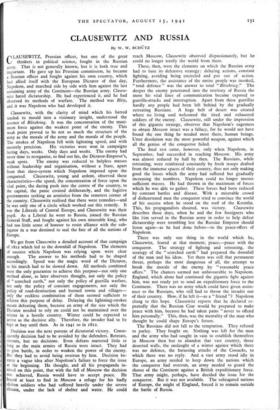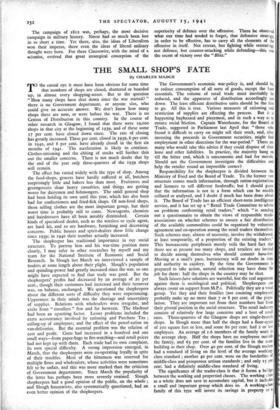CLAUSEWITZ AND RUSSIA
By W. W. SCHUTZ CLAUSEWITZ, Prussian officer, but one of the great thinkers in political science, fought in the Russian army. That is not generally known, but it is both true and important. He gave up his Prussian commission, he became a Russian officer and fought against his own country, which had allied itself with the European Dictator of that day, Napoleon, and marched side by side with him against the last remaining army of the Continent—the Russian army. Clause- witz hated dictatorship. He had experienced it, and he had observed its methods of warfare. The method was Blitz, and it was Napoleon who had developed it.
Clausewitz, with the clarity of mind which his hatred tended to mould into a visionary insight, understood the essence of Blitzkrieg. It was the concentration of the maxi- mum force against the weakest point of the enemy. This weak point proved to be not so much the structure of the army as the morale of the army and the morale of the people. The strokes of Napoleon fell with lightning speed, and with masterly precision. His victories were won in campaigns lasting days, weeks. Only days and weeks. The enemy had never time to reorganise, to find out his, the Dictator-Emperor's, weak spots. The enemy was reduced to helpless masses without leadership and organisation, without a State, apart from that slave-system which Napoleon imposed upon • the conquered. Clausewitz, young and ardent, observed these characteristics—the speed, the concentration of force upon the vital point, the daring push into the centre of the country, to the capital, the panic created deliberately, and the fugitive governments seeking an armistice from the remotest corner of the country. Clausewitz realised that there were remedies—and he was only one of a circle which worked out this remedy. It was the Liberals of Central Europe, and Clausewitz was their pupil. As a Liberal he went to Russia, joined the Russian General Staff, and fought against his own miserable king, who had too little sense of honour to resist alliance with the sub- jugator in a war destined to seal the fate of all the nations of Europe.
We get from Clausewitz a detailed account of that campaign of 1812 which led to the downfall of Napoleon. The elements of success which Napoleon was relying upon were clear enough. The answer to his methods had to be shaped accordingly. Speed was the magic word of the Dictator, so his march had to be slowed down. All methods combined were the only guarantee to achieve this purpose—not only one method alone, as later observers thought, not only the policy of " scorched earth," not only the policy of guerilla warfare, not only the policy of constant engagements, not only the policy of road-destruction and burned towns and villages— only the reckless combination of them seemed sufficient to achieve this purpose of delay. Delaying the lightning-strokes meant defeating them, because an army of the size which the Dictator needed to rely on could not be maintained over the winter in a hostile country. Winter could be expected to arrive as the decisive ally. Therefore, the invader had to be kept at bay until then. As in 1941 so in 1812.
Decision was the next portent of dictatorial victory. Conse- quently decision had to be avoided by the defenders. Retreats, retreats, but no decisions. Even defeats mattered little as long as the main armies of Russia were intact. They had to give battle, in order to weaken the power of the enemy. But they had to avoid being overrun by him. Decision be- came a vague idea after Napoleon's failure to force the issue at the beginning. He thought, and all his propaganda in- sisted on this point, that with the fall of Moscow the decision was achieved, Russia would have to accept peace. He hoped at least to find in Moscow a refuge for his badly shaken soldiers who had suffered heavily under the severe climate, under the lack of shelter and water. He could reach Moscow, Clausewitz observed dispassionately, but he could no longer terrify the world from there.
These, then, were the elements on which the Russian army had to base its defensive strategy : delaying actions, constant fighting, avoiding being encircled and put out of action.
Furthermore, the assistance of the entire people was invoked, " total defence " was the answer to total " Blitzkrieg." The deeper the enemy penetrated into the territory of Russia the more his vital lines of communication became exposed to guerilla-attacks and interruption. Apart from these guerillas hardly any people had been left behind by the gradually retreating Russians. A huge belt of desert was created where no living soul welcomed the tired and exhausted soldiers of the enemy. Clausewitz, still under the impression of this gigantic strategy, observes that Napoleon's eagerness to obtain Moscow intact was a fallacy, for he would not have found the one thing he needed most there, human beings. Utter desolation was the most powerful weapon, against which all the genius of the conqueror failed.
The final test came, however, only when Napoleon, in September, had succeeded in reaching Moscow. His army was almost reduced by half by then. The Russians, while retreating, were reinforced constantly by fresh troops drafted from the immense spaces of their country, thus not only making good the losses which the army had suffered but gradually increasing the numbers. Napoleon could no longer muster sufficient masses. He had thrown in the maximum of forces which he was able to gather. These forces had been reduced by constant battles and disease. With a miserable crowd of disheartened men the conqueror tried to convince the world of his success when he stood on the roof of the Kremlin.
This, his propagandists shouted, was victory. Clausewitz describes those days, when he and the few foreigners who like him served in the Russian army in order to help defeat dictatorship were trembling lest the Russian Emperor should listen again—as he had done before—to the peace-offers of Napoleon.
There was only one thing in the world which he, Clausewitz, feared at that moment, peace,—peace with the conqueror. The strategy of fighting and retreating, the strategy of the " scorched earth " had prepared the downfall of the man and his ideas. Yet there was still that permanent threat, perhaps the most dangerous of all, the attempt to break the morale of the enemy by " reasonable peace offers." The chances seemed not unfavourable to Napoleon. England, which alone had continued the gigantic fight against him, was not ready yet to send an expeditionary force to the Continent. There was no army which could have given assist- ance to the Russians, who still had to throw the invader out of their country. How, if he left it—as a " friend "? Napoleon dung to this hope. Clausewitz reports that he declared re- peatedly that the Russian Czar would be prepared to make peace with him, because he had taken pains " never to offend him personally." This, then, was the mentality of the man who thought he could shape Europe's future.
The Russians did not fall to the temptation. They refused to parley. They fought on. Nothing was left for the man and the army who had sought in vain to establish themselves in Moscow then but to abandon that vast country, those deserted walls, the onslaught of a winter against which there was no defence, the harassing attacks of the Cossacks, to which there was no reply. And a vast army stood idle in Europe, an army needed to keep down the nations which the conqueror had overrun, an army needed to guard the shores of the Continent against a British expeditionary force. That army might, perhaps, have decided the issue for the conqueror. But it was not available. The subjugated nations of Europe, the might of England, forced it to remain outside the battle of Russia. The campaign of 1812 was, perhaps, the most decisive campaign in military history. Never had so much been lost in so short a time. Yet there, also, the ideas of Liberalism won their impetus, there even the ideas of liberal military thought were born. For there Clausewitz, with the mind of a scientist, evolved that great strategical conception of the superiority of defence over the offensive. There he observed what our time had tended to forget, that defensive strategy, in order to be effective, has to carry all the elements of the offensive in itself. Not retreat, but fighting while retreating; not defence, but counter-attacking while defending—this was the secret of victory over the "Blitz."



























 Previous page
Previous page